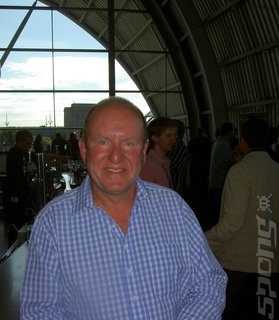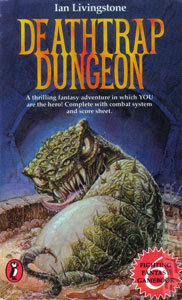Do you need me to introduce Ian Livingstone to you? There's a good chance you don't – if that's you, skip the next paragraph.
Ian Livingstone has been in interactive entertainment, in one form or another, since before many of us were a twinkle in anything at all, never mind our fathers' eyes. He co-founded Games Workshop in 1975, brought Dungeons and Dragons to Europe and co-produced the Fighting Fantasy series of interactive gamebooks with Steve Jackson. Moving on to the games industry, he became deputy chairman of games company Domark, proving instrumental in its merger with then-technology company Eidos. He served in a number of senior roles before recently being named Life President of the latter. He's got a list of awards as long as your arm, so right now I'm just going to point out that he has an OBE and a BAFTA.
This week, Ian served as host for the GameHorizon conference up in Gateshead, which had attendance from the likes of Splash Damage's Paul Wedgwood, Quantic Dream's Guillaume de Fondaumiere, Epic's Mark Rein and Peter Edward, director of PlayStation Home. SPOnG was on hand and I sat down with Ian to discuss the conference, the roots of Heavy Rain and Eidos's new world order under Square Enix.
SPOnG: So, how has Game Horizon been for you?
Ian Livingstone: I think it's been a great success. There (have been) some incredible speakers that Game Horizon have got together, leading off with Dave Jones from Realtime Worlds telling us how he's going to conquer the world with APB, and it's very ambitious, and he could very well conquer the world.
More importantly, I think, the whole conference has been centred on online and how content creators can connect with their consumers directly, and monetise their content and I think that everyone's learned a lot. There have been some great speeches, some great debates, some fantastic networking opportunities and I think everyone's pretty satisfied with the event.
SPOnG: We were talking about Heavy Rain (which was shown at the conference) a minute ago and something that occurred to me is that it's very much an extension of what you were doing with paper back in the eighties with Steve Jackson and the Fighting Fantasy series. What do you make of it?
Ian Livingstone: Well, Fighting Fantasy was, I guess, one of the forerunners of interactive entertainment, pre-technology. It's nice to see it's still in use, albeit supported by technology and graphics. It just goes to show that the interactivity of Fighting Fantasy was at the core of a certain kind of gameplay, and obviously it's been usurped by computer games, but it's nice to see that the mechanism is still attractive to people, and Heavy Rain looks like a brilliant example of interactive fiction, with all the benefits of technology and graphics behind it.
SPOnG: Does it make you want to go off and make a Fighting Fantasy game for next-gen consoles?
Ian Livingstone: (Laughs) I'd like someone to license Fighting Fantasy and I could (have) an executive producer role. I'm not sure if I'm quite up to doing the whole thing myself!
SPOnG: So, with Eidos, the big news is obviously the Square Enix takeover. How has it affected Eidos as a publisher?
Ian Livingstone: For many years we were never in the major league of publishing. We didn't have the cash reserves of the major publishers. Even though we had the intellectual property, the development studios, we didn't have that critical mass. We were too small as a publisher, so cash was often a problem.
It was great to partner with someone like Square Enix, who saw the value of our intellectual property, saw the value of our development studios and our ability to create original content that the market wanted. With the strength of their balance sheet behind us, I think we can go on now to be a wonderful global company. We are going to remain independent, the Eidos label will remain. We're a wholly-owned subsidiary of Square Enix.
So they're not looking to take our IP and move it back to Japan. On the contrary, what they want (is) to build on the strength of what we've done, so the whole group will become a global content creating company addressing a global audience, which is a great thing, not just for the group or for us, particularly. From my point of view, for the Eidos employees.
Ian Livingstone has been in interactive entertainment, in one form or another, since before many of us were a twinkle in anything at all, never mind our fathers' eyes. He co-founded Games Workshop in 1975, brought Dungeons and Dragons to Europe and co-produced the Fighting Fantasy series of interactive gamebooks with Steve Jackson. Moving on to the games industry, he became deputy chairman of games company Domark, proving instrumental in its merger with then-technology company Eidos. He served in a number of senior roles before recently being named Life President of the latter. He's got a list of awards as long as your arm, so right now I'm just going to point out that he has an OBE and a BAFTA.
This week, Ian served as host for the GameHorizon conference up in Gateshead, which had attendance from the likes of Splash Damage's Paul Wedgwood, Quantic Dream's Guillaume de Fondaumiere, Epic's Mark Rein and Peter Edward, director of PlayStation Home. SPOnG was on hand and I sat down with Ian to discuss the conference, the roots of Heavy Rain and Eidos's new world order under Square Enix.
SPOnG: So, how has Game Horizon been for you?
Ian Livingstone: I think it's been a great success. There (have been) some incredible speakers that Game Horizon have got together, leading off with Dave Jones from Realtime Worlds telling us how he's going to conquer the world with APB, and it's very ambitious, and he could very well conquer the world.
More importantly, I think, the whole conference has been centred on online and how content creators can connect with their consumers directly, and monetise their content and I think that everyone's learned a lot. There have been some great speeches, some great debates, some fantastic networking opportunities and I think everyone's pretty satisfied with the event.
SPOnG: We were talking about Heavy Rain (which was shown at the conference) a minute ago and something that occurred to me is that it's very much an extension of what you were doing with paper back in the eighties with Steve Jackson and the Fighting Fantasy series. What do you make of it?
Ian Livingstone: Well, Fighting Fantasy was, I guess, one of the forerunners of interactive entertainment, pre-technology. It's nice to see it's still in use, albeit supported by technology and graphics. It just goes to show that the interactivity of Fighting Fantasy was at the core of a certain kind of gameplay, and obviously it's been usurped by computer games, but it's nice to see that the mechanism is still attractive to people, and Heavy Rain looks like a brilliant example of interactive fiction, with all the benefits of technology and graphics behind it.
SPOnG: Does it make you want to go off and make a Fighting Fantasy game for next-gen consoles?
Ian Livingstone: (Laughs) I'd like someone to license Fighting Fantasy and I could (have) an executive producer role. I'm not sure if I'm quite up to doing the whole thing myself!
SPOnG: So, with Eidos, the big news is obviously the Square Enix takeover. How has it affected Eidos as a publisher?
Ian Livingstone: For many years we were never in the major league of publishing. We didn't have the cash reserves of the major publishers. Even though we had the intellectual property, the development studios, we didn't have that critical mass. We were too small as a publisher, so cash was often a problem.
It was great to partner with someone like Square Enix, who saw the value of our intellectual property, saw the value of our development studios and our ability to create original content that the market wanted. With the strength of their balance sheet behind us, I think we can go on now to be a wonderful global company. We are going to remain independent, the Eidos label will remain. We're a wholly-owned subsidiary of Square Enix.
So they're not looking to take our IP and move it back to Japan. On the contrary, what they want (is) to build on the strength of what we've done, so the whole group will become a global content creating company addressing a global audience, which is a great thing, not just for the group or for us, particularly. From my point of view, for the Eidos employees.



